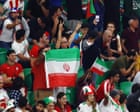

President Donald Trump's recent travel ban, enacted in response to a terror attack in Boulder, Colorado, has sparked outrage and disappointment among Iranian football fans who were eagerly anticipating the 2026 FIFA World Cup, which the U.S. is co-hosting with Canada and Mexico. The ban, which bars citizens from 12 countries, including Iran, from entering the U.S., has crushed the dreams of many Iranians who saw the tournament as a rare opportunity to support their national team, Team Melli, on American soil.
While the ban includes exemptions for athletes, coaches, essential staff, and immediate family members participating in major sporting events like the World Cup and the Olympics, it does not extend to ordinary fans. This means that while Iranian players and staff will be allowed to travel to the U.S. for the tournament, ordinary Iranian fans will be barred from entering the country.
The decision has been met with strong criticism and anger in Iran. Sohrab Naderi, a Tehran-based football fan who attended the 2022 World Cup in Qatar, expressed his disappointment, saying, "My friends and I have been waiting for years to watch Team Melli play in a World Cup on U.S. soil… Now that dream is shattered because of politics that we don't control". He called the ban "inhumane" and "degrading to all Iranians," emphasizing that "Every country's fans should be allowed to support their team". Another Iranian football fan, Hasti Teymourpour, echoed this sentiment, stating, "Every Iranian has the right to support their team, just as much as any other country, whether the game is in America or in any other country".
The travel ban has not only dashed the hopes of Iranian fans but has also raised questions about the suitability of the U.S. as a host nation for major international sporting events. Critics argue that the ban goes against the spirit of the World Cup, which is meant to be a global celebration of unity and sportsmanship. Some have called on FIFA to intervene and ensure that all qualified teams and their supporters are able to participate in the tournament.
The situation is further complicated by the already strained relations between Iran and the U.S., which have been severed since the 1979 Islamic revolution. The two countries are currently engaged in talks over Iran's nuclear program, with the U.S. threatening military action if no deal is reached. Some observers believe that sports diplomacy could play a role in easing tensions between the two countries, with the World Cup serving as an opportunity for people-to-people engagement. "Sports diplomacy can act as a strong catalyst and bring the efforts of political diplomats to fruition sooner," said political commentator Mohammad Reza Manafi.
Despite the disappointment and frustration, some Iranians remain hopeful that a breakthrough in nuclear talks could lead to a softening of the policy before the tournament. Others are exploring alternative options, such as attempting to circumvent the ban by using different passport options, as those indulging in international travel for sporting events are usually from a higher wealth bracket. However, the uncertainty surrounding the situation has cast a shadow over Iran's participation in the 2026 World Cup and left many Iranian fans feeling disheartened and excluded.
FIFA has yet to comment on the ban, but the pressure is mounting for the organization to address the issue and ensure that the 2026 World Cup is a truly inclusive and global event. As one social media user wrote, "How is it even possible to have a World Cup in a country that won't allow foreign fans?". The question remains whether FIFA will be able to navigate the complex political landscape and uphold its commitment to unity and inclusivity in the face of the U.S. travel ban.